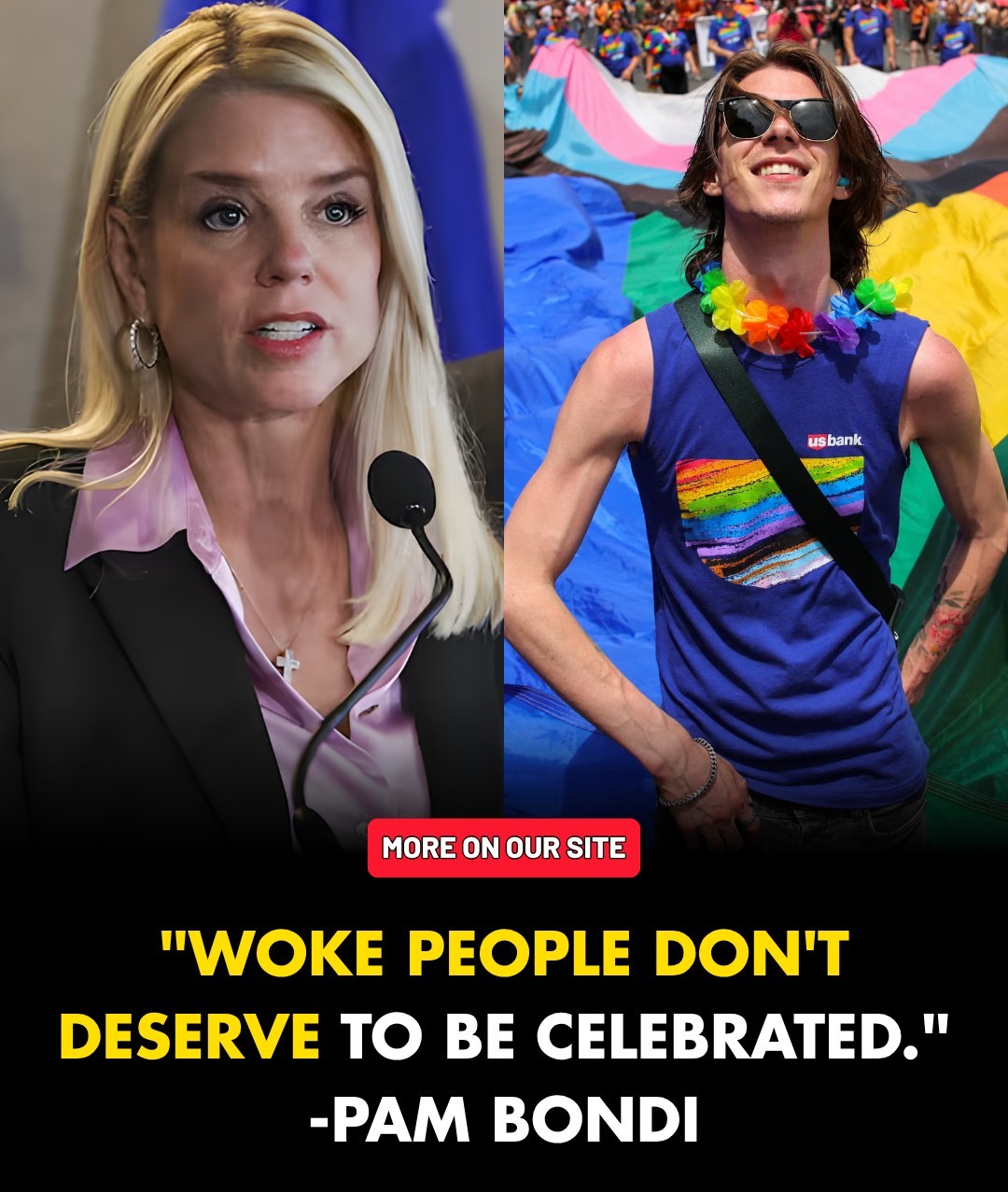In an explosive on-air exchange that quickly went viral, former Florida Attorney General Pam Bondi stunned viewers and panelists alike when she declared that she would not participate in any Pride Month celebrations, calling the event part of what she described as the “WOKE agenda.” Her statements — made during a live broadcast — have ignited intense backlash from LGBTQ+ advocates, celebrities, and political commentators nationwide.

The Controversial Broadcast
The controversy began during a recent television appearance on a morning talk show, where Bondi was asked about her stance on Pride Month events. In a moment that has since been replayed thousands of times across social media, Bondi bluntly stated:
“I don’t believe Pride deserves to be celebrated. I think this entire WOKE movement has gone too far. Whether gay people are going against nature — that’s a question no one seems brave enough to ask.”
Her remarks were followed by a stunned silence in the studio, according to multiple reports. The host reportedly attempted to steer the discussion toward inclusion and equality, but Bondi continued her criticism, claiming that “traditional values” were being overshadowed by what she called “performative activism.”
Online Backlash and Viral Reactions
Within minutes of airing, clips of the exchange flooded X (formerly Twitter), TikTok, and YouTube. The hashtags #PamBondi, #PrideMonth, and #WokeAgenda began trending, with users from across the political spectrum weighing in.
One viewer posted:
“Pam Bondi just said out loud what most bigots think in private. It’s 2025 — and she still believes being gay is ‘against nature’? Shameful.”
Another wrote,
“The irony of calling others ‘woke’ while being this asleep to human decency is unbelievable.”
Prominent figures, including LGBTQ+ advocates and fellow TV hosts, condemned her statements. Television personality Andy Cohen tweeted that Bondi’s comments were “a disgraceful attack on the millions who simply want to be accepted.”
By the end of the day, the viral clip had garnered over 12 million views, sparking debates not only about Bondi’s comments but also about the growing culture-war divide in American media.
Advocacy Groups Respond
Several human rights and equality organizations issued formal responses within hours. The Human Rights Campaign (HRC) released a statement condemning Bondi’s rhetoric:
“Pam Bondi’s remarks are dangerous, regressive, and entirely out of step with American values of equality and dignity. Pride Month exists to honor resilience in the face of discrimination — exactly the kind of discrimination these comments perpetuate.”
The GLAAD organization echoed that sentiment, emphasizing that public figures have a responsibility to use their platforms for inclusivity rather than division.
“Language like this fuels hate and intolerance,” the statement read. “When someone in a position of power dismisses an entire community’s right to celebration, it encourages hostility and prejudice.”
Political Repercussions and Divided Reactions
Bondi, a longtime conservative figure known for her work in the Trump administration, has often positioned herself as a critic of what she labels “woke culture.” Her latest remarks, however, appear to have pushed that criticism to a new extreme — one that even some fellow conservatives found troubling.
A former Republican strategist, speaking anonymously, told Politico,
“Pam is playing to the far-right base, but this kind of rhetoric alienates moderate voters who don’t want hate speech paraded as free speech.”
Still, Bondi’s comments found support among certain conservative media circles. A few commentators on right-wing networks praised her for “standing up for Christian values” and “pushing back against forced political correctness.”
This duality highlights the widening rift within the American right — between those who champion traditional values and those who believe the culture wars have become too extreme to be politically viable.
The Bigger Picture: A Nation Still Divided
The uproar surrounding Bondi’s comments underscores the continuing polarization over LGBTQ+ rights in the United States. While Pride Month has become a mainstream celebration embraced by corporations, schools, and cities across the country, it remains a flashpoint for culture-war debates.
Sociologist Dr. Mariah Henderson notes that Bondi’s rhetoric reflects a broader backlash movement:
“When inclusion becomes visible — whether through Pride parades or rainbow flags in schools — those who feel threatened by social change react with hostility. Pam Bondi’s comments are part of that reaction.”
The controversy also raises questions about how the media should handle inflammatory speech. Some argue that giving figures like Bondi airtime only amplifies intolerance, while others insist that open dialogue, even uncomfortable dialogue, is essential to democracy.
Bondi Stands Firm
Despite the avalanche of criticism, Bondi has not walked back her statements. In a brief follow-up interview, she insisted that she was “simply expressing her beliefs” and accused critics of “cancel culture.”
“This isn’t about hate,” Bondi said. “It’s about standing up against an agenda that’s being forced on Americans who just want to live according to their values.”
Her defense, however, has done little to quell the outrage. Several advocacy groups are now calling for the networks that employ her as a guest commentator to reconsider her role. Some advertisers have reportedly expressed discomfort with being associated with programs featuring Bondi.
The Aftermath: A Cautionary Tale for Public Figures
The Pam Bondi incident is the latest in a series of controversies highlighting how quickly divisive comments can spiral in today’s media environment. In the age of instant clips, hashtags, and outrage cycles, public figures face increasing accountability — and scrutiny — for their words.
For many LGBTQ+ supporters, Bondi’s statements serve as a reminder of why Pride Month exists in the first place: to celebrate progress, visibility, and love in the face of persistent prejudice.
As one activist poignantly summarized on social media:
“Pride was born as a protest against silence and shame. Pam Bondi’s hate speech just proves we still need it — now more than ever.”